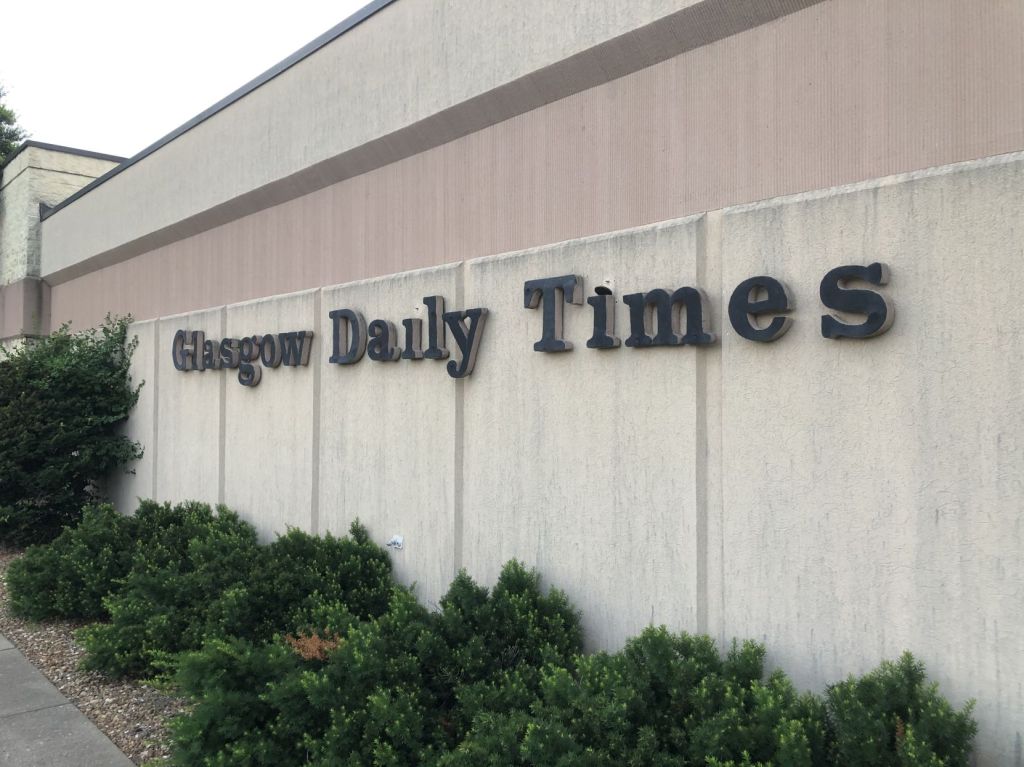Glasgow newspaper ceases print edition, converts to digital
Published 8:15 pm Tuesday, June 9, 2020

- The now-shuttered offices of the Glasgow Daily Times are seen Tuesday, June 9, 2020, the final day the newspaper produced a print edition.
Citing financial burdens brought on by the COVID-19 pandemic, the Glasgow Daily Times published its final print edition Tuesday and announced it would go forward as a digital-only publication.
A memo from Daily Times publisher Bill Hanson that was published Tuesday said steep losses in revenue caused by the pandemic and other issues contributed to the decision to shutter the print edition.
Trending
“The conversion from print to digital only for the Daily Times is necessary due to major losses of advertising revenue during the COVID-19 emergency on top of burdensome print delivery costs, newsprint and ink expenses, and the production outlay required to run the presses,” Hanson said in the memo. “We urge Daily Times subscribers to continue to support the newspaper online.”
Hanson did not respond to an email requesting additional comment.
Exactly how the digital-only publication will function is unknown. Local staffing was not addressed in the published memo, but a newsroom staffer posted on social media that the entire staff had been terminated. Meanwhile, signs posted Tuesday on the doors of the newspaper building indicate the office is “permanently closed” and directed subscribers to call a telephone number with an Indiana area code.
“It’s a terrible development for the community because the Daily Times has more or less been the newspaper of record for well over 100 years,” said Phil Patton, a retired circuit judge and Glasgow resident who regularly reads the print and online editions. “So many great writers went through there over the years. … It’s a shame what has happened and I think that it will put us at somewhat of a disadvantage.”
The Daily Times is owned by CNHI LLC, an Alabama-based company with newspapers in 22 states. Formerly known as Community Newspaper Holdings Inc., the company is a subsidiary of the Retirement Systems of Alabama.
Earlier this year, four weekly CNHI publications in Kentucky were closed and merged with the Ashland Daily Independent, and 14 CNHI newspapers have closed or merged during the pandemic, according to an article from the Poynter Institute for Media Studies tracking closures and layoffs in the newspaper industry caused by COVID-19.
Trending
Tracing its origins to 1865, the Daily Times touts itself on its website as the community’s oldest continually operating business. A merger of two Glasgow newspapers resulted in the daily publication of the GDT in 1953.
The Daily Times’ journalism garnered nine awards at the 2019 Kentucky Newspaper Association’s annual Excellence in Newspapers convention, and it won first place in that contest in 2015. But the newspaper found itself in a challenging economic environment as the pandemic slowed most commerce to a crawl this spring.
With local businesses buying less advertising space, the Daily Times’ revenues suffered.
In April, Hanson announced that the Daily Times would reduce to a three-day print schedule, discontinuing its Wednesday and Friday editions, and in doing so mentioning the economic effects of the pandemic and “readership changes, newsprint prices, print production expenses and delivery costs” affecting community newspapers as factors.
“It’s been a staple in the community for a century and a half and you just don’t see many businesses that have that kind of longevity,” said James Brown, who worked as an editor in various capacities at the GDT for 13 years and is currently digital director at Commonwealth Broadcasting Corp.
Brown, who left the newspaper in 2016, said the GDT was “the magnet” that drew the Mississippi native to the region. He said he is concerned that the developments at the Daily Times will create a void in news coverage in the area.
“Readers must have a desire to know what’s going on in their community and they have to search that information from media other than social media,” Brown said. “To tell you what’s going on in the world, you need paid professionals trained in the ways of covering government and the public sector.”






